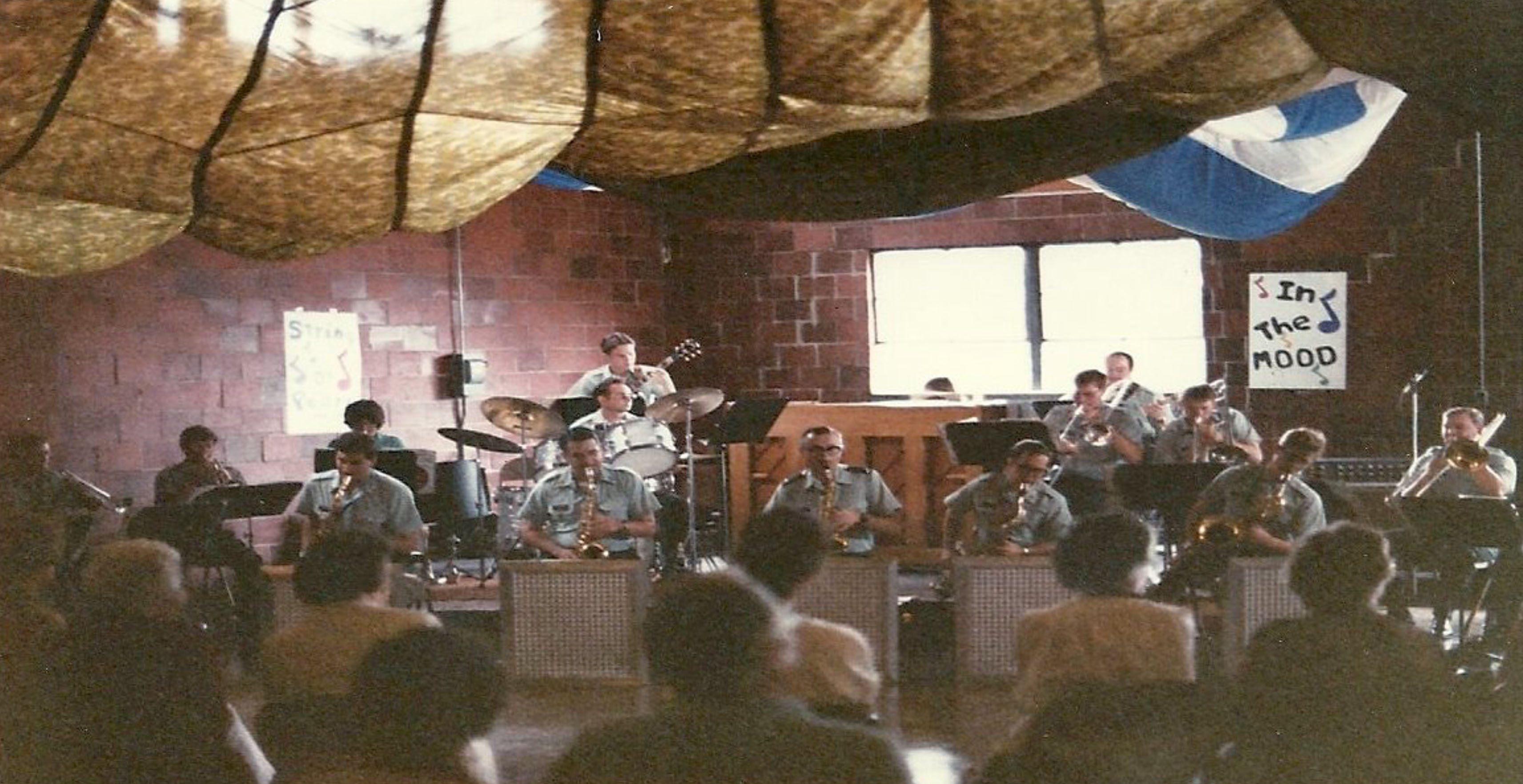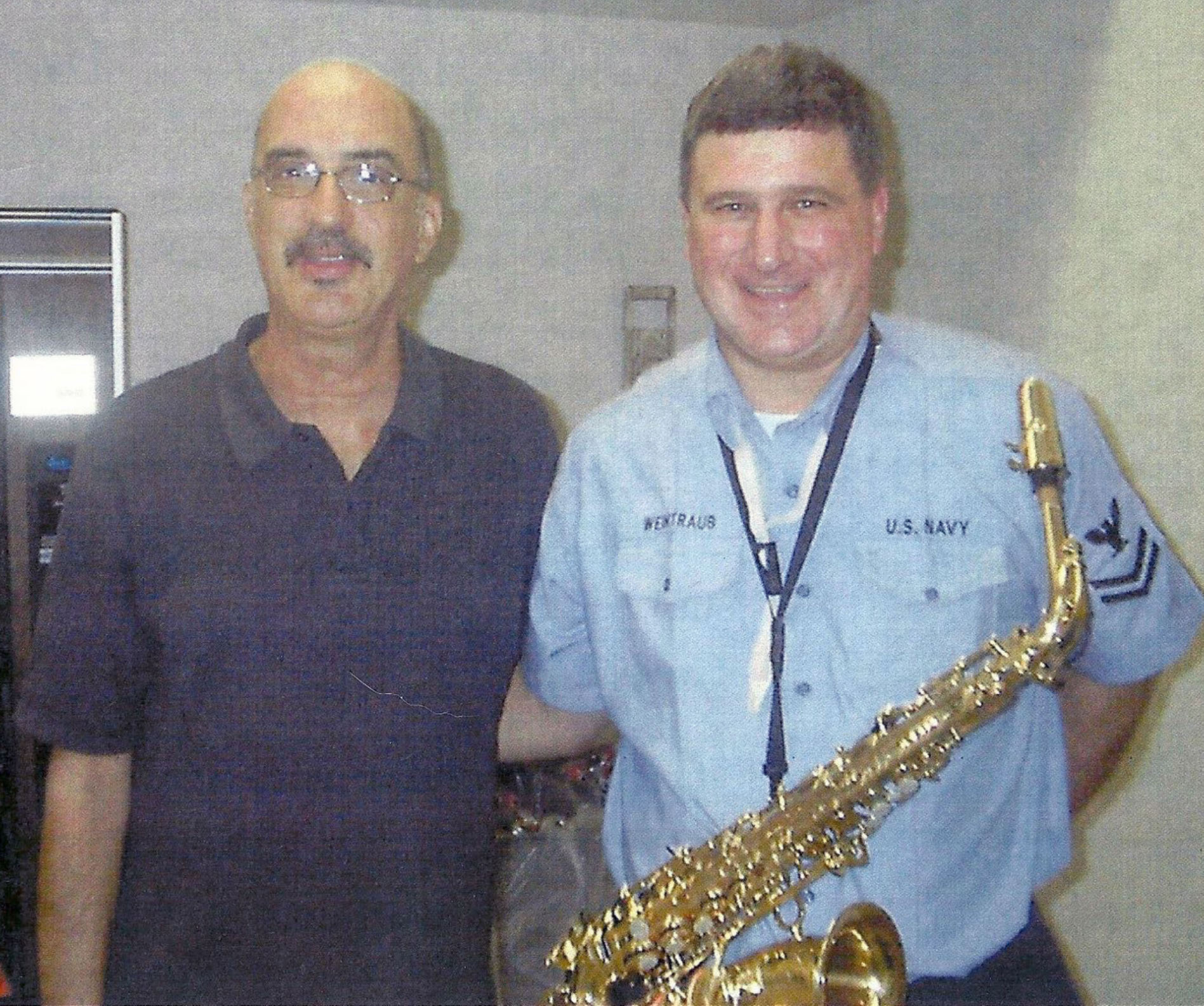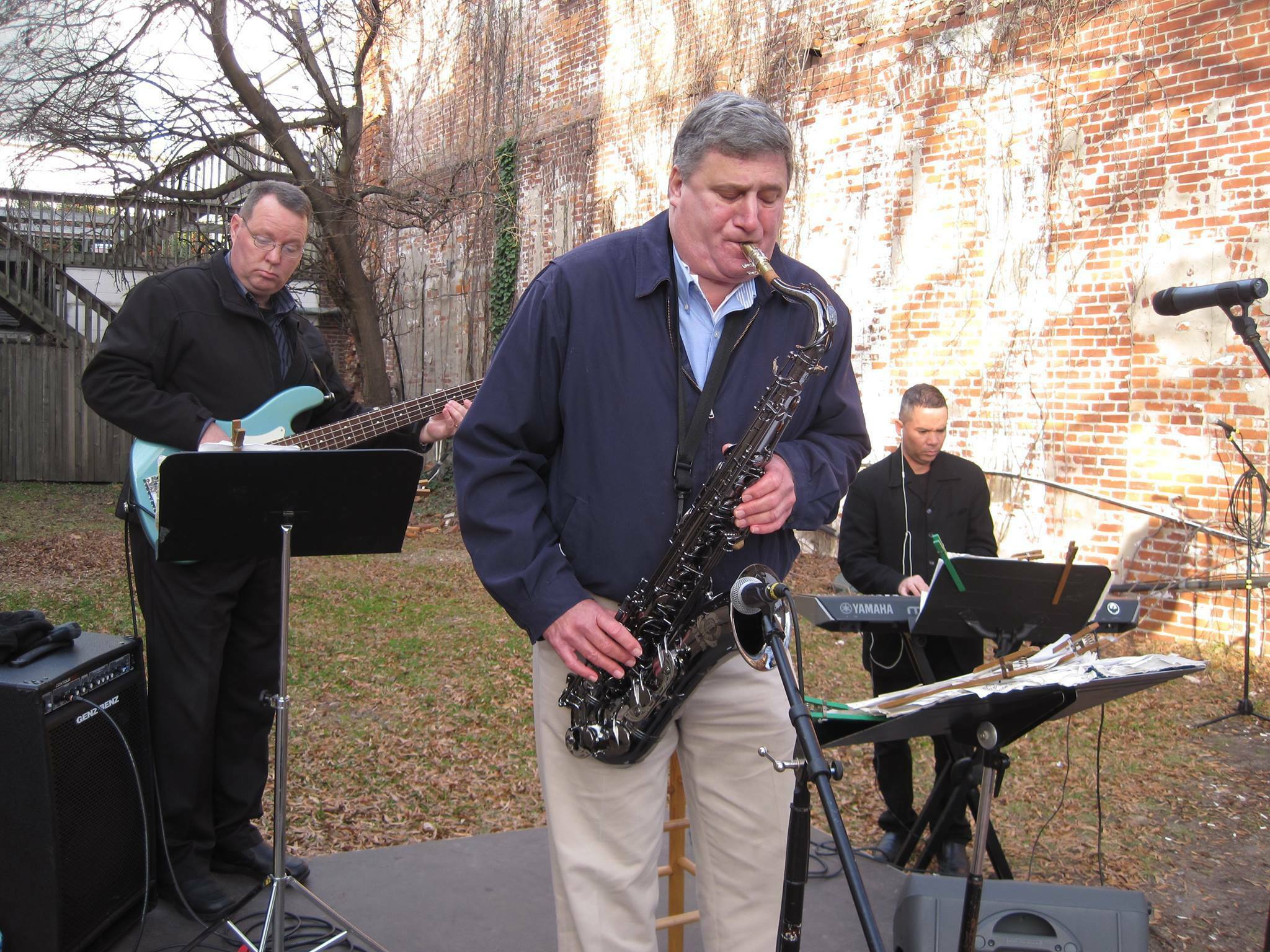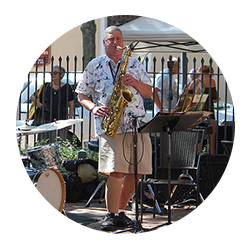My Experience as a Military Musician in Both Army and Navy Bands
with Lawrence Weintraub
Date Posted: February 15, 2021

Photo by JP Valery
Tell us a little about yourself - how did you get your start in music?
I actually started playing music very late. I did not go through the elementary school or the junior high band program. I actually started when I was 15 and a half - the summer between 9th and 10th grade. In those days, 9th grade was part of junior high. I was taking lessons from a guy in Baltimore, his name was Al Sigismondi and he was a union pro. I will say this - when Frank Sinatra or Ella Fitzgerald or Tony Bennett of any people of those levels came to town, he was always in the band.
I started on clarinet when I was 15 and a half basically, it was a choice between clarinet and trumpet. I was in the music store and the guy asked me which instrument I wanted. I said, 'Gee, I don't know.' So I actually pulled a quarter out of my pocket: heads for clarinet and tails for trumpet. It came up heads and clarinet it was!
At 17.5 my teacher started me on alto sax. This was the summer between 11th & 12th grade. I bought a Buescher Aristocrat for $75.00 at the Lucky 7 Pawn Shop inn Baltimore. I took it to a repair tech and for $150 I had a great horn.
Towards the end of senior year, I had to decide what I wanted to do. I was thinking about going into the military at that point. Not necessarily as a bandsman but just doing something. My father wanted me to go to college but I didn't know what to major in; it was either going to be music or history. My father said he didn't care and he just wanted me to go to college. I didn't flip a coin this time but I made it music.
I did a music degree at Towson University which is outside of Baltimore. At that point, I was a clarinet major and a saxophone minor because I had more experience on the clarinet. I was still taking both clarinet and saxophone lessons at the university, playing saxophone in the jazz ensemble, and saxophone in a saxophone quartet.
When it came time to graduate, I didn't want to teach at that point. I felt I was too young, too immature, and I wanted to travel and play music. First I auditioned at the Naval Academy. They told me the Navy did not have any openings for clarinet and saxophone players because they were over staffed (around 1977). Then I called the Air Force and I was rudely told that it didn't make any difference if I was the best saxophone player since Stan Getz or the best clarinet player since Benny Goodman, they didn't have any openings. Goodbye!
I saw an ad for the Army band program in Wind Player magazine and I ripped out the card, filled it out and mailed it off. About a week or two later I got a call from a recruiter asking me if I was ready to go and take an audition. I said, 'I'm ready!' We went down to Fort Meade in Maryland and I did the audition there.
What was the audition process like?
The Navy and the Army auditions, even today, are vastly different.
The Army would not let me play tenor sax, only clarinet. They did not need sax players.At that time the Army audition consisted of a standardized music exam and it started from really easy to grade four. And when I say easy, it was whole notes and half notes. There was about 30-50 excerpts that you had to play. They wanted to hear rhythmic accuracy and good reading. Sight-reading is something that is common to all of the services. It's very big. They want to hear good technique, a decent sound, etc.
I finished the audition on clarinet, packed my stuff up and the recruiter and I left. Couple days later the recruiter calls me up and says, "Well, you passed the audition - they want you!
I could've went to Fort Meade but it was very close to my backyard. I wanted to go someplace different. My recruiter told me there was an opening for clarinet players at Fort Carson, Colorado in Colorado Springs. I said I'll go to that since I've never been west before. He told me it was a division band and that didn't mean anything but I will tell your readers this: the musicians in the division bands were not as good as the musicians in the regular AG (Adjutant General) bands (one like the bands at Fort Meade). There used to be an expression called "division chops" which meant that most of these players weren't that good.
From there I drove out to Colorado Springs and when I got to the band, the first thing you had to do was inprocess. Then I went to the army band that was called the Fourth Infantry Division Band and I listened do a jazz ensemble rehearsal and I said, "Oh, what did I get myself into?" At the school of music, I was in what was known as the student lab band which took me out of the basic band. They rotated bands where you would be in a different band every single week. For dance band or jazz ensemble, it was the same thing. They called them basic bands which is what they called it back then.
A year later we got our new band officer. He was my sax/clar teacher at the School of Music. He started asking me about the band. I told him it was like a basic 2.5 to 2.7 band on a good day. I told him that a lot of people were complacent and didn't practice. He whipped the band into shape. The specialband that went to Iowa for the Glenn Miller Festival was much better.
I was already an E-5/Sergeant when they tried to re-enlist me and was offered a position in the Heidelberg, Germany Band. I turned it down because no one explained to me that it was a 3.0 MACOM Band, the Army's major touring band in Europe and automatic E-6/Staff Sergeant.
I would say to your readers that if you are not in shape and you want to be in a military band, I highly suggest that you get yourself in shape. That's part of it. Not only do you play music, but you do PT. In the Army, you do a lot more PT than you do in the Navy.
How did you decide what military branch you wanted to join?
Go where the job is! If you don't, you're going to be out of luck.
You can always go from service to service which is what I did. I did my three years in the Army, I got out, I played with the Bing Miller Big Band, teaching lessons at two music stores and my parents club basement, and doing lots of doubling. I was playing musical shows for dinner theatres, college theatre department, summer stock, and lots of doubling. The last job I had before I went back into the military was teaching at an all-girl Catholic high school. Unfortunately, that program got cut.
When I went to do the Navy audition, it was a lot different than the Army audition. You can read the article here. When I did it in the Navy they'll ask you for a prepared piece and all 3 forms of minor scales & major scales at random. For sight-reading they asked me to read grade 4 & 5 concert band music. Marches in cut time and 6/8. Sax and clarinet players be able to play The Klaxon. Go over both the alto and tenor part. The alto part is harder but the clarinet part is the hardest.

4th ID Band at the Glenn Miller Festival in Clarinda, Iowa The bus driver took the photo with my camera. I am the tenor player opposite the trumpets.
Tell us a little about the Navy audition?
When I went to do the Navy audition, it was a lot different than the Army audition. Read the article here. When I did it in the Navy they'll ask you for a prepared piece, any three forms of the minor/major scales (they don't do this anymore), plus sightreading. That was the major part of it: sightreading.
For saxophone, they asked me to read a couple of charts.
In the Navy, they asked you to play a tune. At that time it was important. After the audition, I was told I could play clarinet in any of our Navy Fleet Bands. I negotiated my pay and I came in at my former paygrade from the Army. The reason I chose the Navy was that it was the more jazz-oriented program.

Larry Weintraub and Michael Brecker
In Sept 2003 Michael Brecker came & did a 1-day workshop at the Norfolk Navy Band. He listened to all the groups play jazz, the Big Band, Rock Band Combo playing jazz and the Show Band Combo. I was playing alto on the Big Band. I will not go on about what he said about my solo, I do not want to sound arrogant. But to the Big Band he said "your intonation is better than what I hear in the studios in NYC." He also said, "the band was swinging with a nice blend in the sax section." For more on Brecker visit My Day With Michael Breaker: His Insight and Wisdom.
Tell us a little about the groups you were involved in within the military and outside the military?
First off I was the leader of several groups. They were the Dixieland Band, The Sax Quartet and best of all the Fleet Jazz Combo. I was the arranger and tenor sax soloist for TGIF an eight piece Dixie/Swing/R & B/Country Band.
One of the best things was being a Musical Ambassador for America. Showing the good side of America through music! I played in the US Navy Show Band on a tour of West Africa. I was in a big band that played in Trinidad & Tobago for 2 years in a row for their Independence Day Festival.
Besides all of that I was in the Ceremonial Band (we did A LOT of ceremonies, sometimes up to four a day), marching band, Concert Band/Wind Ensemble, Four Star Edition Rock Band and backup bands. As a Navy Band member I was in backup bands for Chuck Mangione, Keely Smith, Lee Greenwood, Marv Stamm and Roan Tinan. As a civilian I played in backup bands for The Four Tops, Al Martino and Camella Qunn an Irish singer.
What kind of other jobs did you have in the military?
In the Navy, they had what was called "collateral duties." I was MMA (Master in Arms) which meant I would assign the Juniors their cleaning jobs. Before that I was a Transportation Petty Officer. My last 5 years involved being the Building Manager for the Atlantic Fleet Band. If you're in the military band, you're going to have a secondary job.
What were some unique opportunities the military provided?
After 9/11 I became eligible for the post-9/11 GI bill to go to Old Dominion University to get my master’s in music ed on their dime.
There are jobs in the military bands but you're going to have to read my article and read the requirements for each branch. There's one downside to all of this. Today, in order to be a careerist, you have to be able to make E6 which is Petty Officer First Class within 16 years. They have a lot of people with Bachelors and Master in Performance or Education from all of these fancy universities but they didn't get promoted. It's extremely competitive.
Many times in the Navy only zero, one or two people will get promoted to E-6. In the Navy Bands just about everyone has either a BS in Education, a BA or BM in performance or a Masters in Education or performance. So the competition is tough. Plus there is politics involved.
When I was in the Navy up to 2005 they did not give you any extra promotion points for college credits earned prior to enlisting. However, the Army did. So with my Music Degree and 128 credits, I received a lot of points. So these are good questions for a recruiter.
What did you do outside of the military?
Outside the military and music I played basketball and dated girls. Music-wise I also played musical shows for Summer Stock, college theater, regional theater & dinner theater. This required a lot of doubling between tenor/alto sax and clarinet. You really had to be able to nail the part. When you played sax you needed to sound like a sax player not a clarinet player trying to play sax. The opposite is also true.
When I went back to Baltimore in 1981, I got hooked up with the Bing Miller Big Band which was a really good band. All the guys in the band were veterans of name bands...like Glenn Miller Band, Tommy Dorsey Band, Harry James Band, Lionel Hampton, Buddy Rich, etc. I was 24/25 and all these guys had all of this experience, so I played with them.
I was told that even though it was obvious that I played tenor sax better than clarinet, I stilled played clarinet well enough for the Fleet Bands. So because they needed clarinet players I had to come in as a clarinet major and sax minor. I switched my major to saxophone when I went back to the Armed Forces School of Music a few years later.
What advice would you have for someone looking to be a military musician?
To be a careerist you must make E-6 by the 16 yr mark. (That is Petty Officer 1st Class in the Navy, Staff Sgt in the Army and Marines and I believe it's called Tech Sgt in the USAF). Although it sounds reasonable especially for people w/BS, BA and MM degrees it can be very hard when only a few people are promoted each cycle. There are 2 test cycles a year. In the Navy it has been zero, one or two people promoted a cycle. Of course in any one cycle, you may have 75 - 100 people testing just in the MU (Navy Band rate). So if 100 people test and two get promoted that is a .02% rate. That is really low.
If people want to travel I highly recommend that they go to Overseas Band. Both Navy Bands in Italy and Japan do extensive travel. The Norfolk Navy Band does a fair amount of traveling overseas. In recent years they have gone to Argentina during the summer for the Independence Day celebrations. The USAF has a band in Germany, England and Japan that does their fair share of travel.
The Army has a band in Germany, plus the NATO Band in Brussels that travel some. The Army also has a band in Japan and 2 bands in Korea. Those bands do not seem to travel as much as other bands but you are living in Japan or Korea and experiencing those cultures. The Stateside bands all have their territory that they cover. So people will get to see and play in other parts of the country that they may have never seen before.
So again a BIG PLUS is travel, travel, travel. When I was in the Navy and Army, our free time was our own and we really had plenty of free time on the road.

Swing Time Trio - Larry's current group

About the Author
Larry teaches saxophone/clarinet in Old Dominion University's Community Music Division. Larry has performed with musicians around the world including Al Martino, Camella Quinn, The Four Tops, Chuck Mangione, Kelly Smith, Lee Greenwood, Marv Stamm and Roan Tinan. Some of the mentors and teachers Larry has studied with include Eddie Palanker, Joe Briscuso, Ron Diehl, Tim Price, Dennis Zeisler and Marty Nau.
Larry has played joint performances with the 1st Irish Army Band, The Corrs, various British Royal Marine Bands, Dutch, German, Spanish and the French Foreign Legion Band. I've been in 14 Military Tattoos both here and abroad. Email me Larry for further conversation: Lweintraub1@cox.net